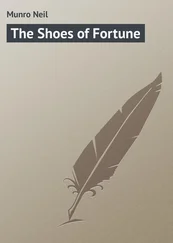Neil Munro - The Daft Days
Здесь есть возможность читать онлайн «Neil Munro - The Daft Days» — ознакомительный отрывок электронной книги совершенно бесплатно, а после прочтения отрывка купить полную версию. В некоторых случаях можно слушать аудио, скачать через торрент в формате fb2 и присутствует краткое содержание. Жанр: foreign_prose, на английском языке. Описание произведения, (предисловие) а так же отзывы посетителей доступны на портале библиотеки ЛибКат.
- Название:The Daft Days
- Автор:
- Жанр:
- Год:неизвестен
- ISBN:нет данных
- Рейтинг книги:4 / 5. Голосов: 1
-
Избранное:Добавить в избранное
- Отзывы:
-
Ваша оценка:
- 80
- 1
- 2
- 3
- 4
- 5
The Daft Days: краткое содержание, описание и аннотация
Предлагаем к чтению аннотацию, описание, краткое содержание или предисловие (зависит от того, что написал сам автор книги «The Daft Days»). Если вы не нашли необходимую информацию о книге — напишите в комментариях, мы постараемся отыскать её.
The Daft Days — читать онлайн ознакомительный отрывок
Ниже представлен текст книги, разбитый по страницам. Система сохранения места последней прочитанной страницы, позволяет с удобством читать онлайн бесплатно книгу «The Daft Days», без необходимости каждый раз заново искать на чём Вы остановились. Поставьте закладку, и сможете в любой момент перейти на страницу, на которой закончили чтение.
Интервал:
Закладка:
Besides the sound of the bell and the universal practice of the fifes there were loud vocalists at the Cross, and such laughter in the street that Kate was in an ecstasy. Once, uplifted beyond all private decorum, she kilted her gown and gave a step of a reel in her kitchen solitude.
“Isn’t it cheery, the noise!” she exclaimed delightly to the letter-carrier who came to the window with the morning’s letters. “Oh, I am feeling beautiful! It is – it is – it is just like being inside a pair of bagpipes.”
He was a man who roared, the postman, being used to bawling up long common-stairs in the tenements for the people to come down to the foot themselves for their letters – a man with one roguish eye for the maiden and another at random. Passing in the letters one by one, he said in tones that on a quieter day might be heard half up the street, “Nothing for you, yourself, personally, Kate, but maybe there’ll be one to-morrow. Three big blue anes and seven wee anes for the man o’ business himsel’, twa for Miss Dyce (she’s the wonderfu’ correspondent!), and ane for Miss Alison wi’ the smell o’ scented perfume on’t – that’ll be frae the Miss Birds o’ Edinburgh. And I near forgot – here’s a post-caird for Miss Dyce: hearken to this —
“‘Child arrived Liverpool yesterday; left this morning for Scotland. Quite safe to go alone, charge of conductor. Pip, pip! Molyneux.’”
“Whatna child is it, Kate?”
“‘Pip, pip!’ What in the world’s ‘Pip, pip’? The child is brother William’s child, to be sure,” said Kate, who always referred to the Dyce relations as if they were her own. “You have heard of brother William?”
“Him that was married on the play-actress and never wrote home?” shouted the letter-carrier. “He went away before my time. Go on; quick, for I’m in a desperate hurry this mornin’.”
“Well, he died abroad in Chickagoo. God have mercy on him dying so far away from home, and him without a word of Gaelic in his head! and a friend o’ his father ’s bringing the boy home to his aunties.”
“Where in the world’s Chickagoo?” bellowed the postman.
“In America, of course, – where else would it be but in America?” said Kate contemptuously. “Where is your education not to know that Chickagoo is in America, where the servant-maids have a pound a-week of wages, and learn the piano, and can get married when they like quite easy?”
“Bless me! do you say so?” cried the postman in amazement, and not without a pang of jealousy.
“Yes, I say so!” said Kate in the snappish style she often showed to the letter-carrier. “And the child is coming this very day with the coach-and-twice from Maryfield railway station – oh them trains! them trains! with their accidents; my heart is in my mouth to think of a child in them. Will you not come round to the back and get the Mustress’s New Year dram? She is going to give a New Year dram to every man that calls on business this day. But I will not let you in, for it is in my mind that you would not be a lucky first-foot.”
“Much obleeged,” said the postman, “but ye needna be feared. I’m not allowed to go dramming at my duty. It’s offeecial, and I canna help it. If it was not offeecial, there’s few letter-carriers that wouldna need to hae iron hoops on their heids to keep their brains from burstin’ on the day efter New Year.”
Kate heard a voice behind her, and pulled her head in hurriedly with a gasp, and a cry of “Mercy, the start I got!” while the postman fled on his rounds. Miss Dyce stood behind, in the kitchen, indignant.
“You are a perfect heartbreak, Kate,” said the mistress. “I have rung for breakfast twice, and you never heard me, with your clattering out there to the letter-carrier. It’s a pity you cannot marry the glee party, as Mr Dyce calls him, and be done with it.”
“Me marry him!” cried the maid indignantly. “I think I see myself marryin’ a man like yon, and his eyes not neighbours.”
“That’s a trifle in a husband if his heart is good: the letter-carrier’s eyes may – may skew a little, but it’s not to be wondered at, considering the look-out he has to keep on all sides of him to keep out of reach of every trollop in the town who wants to marry him.”
And leaving Kate speechless at this accusation, the mistress of the house took the letters from her hands and went to the breakfast-table with them.
She had read the contents of the post-card before she reached the parlour; its news dismayed her.
“Just imagine!” she cried. “Here’s that bairn on his way from Liverpool his lee-lone, and not a body with him!”
“What! what!” cried Mr Dyce, whose eyes had been shut to say the grace. “Isn’t that actor-fellow, Molyneux, coming with him, as he promised?”
Miss Dyce sunk in a chair and burst into tears, crushing the post-card in her hand.
“What does he say?” demanded her brother.
“He says – he says – oh, dear me! – he says ‘Pip, pip!’” quoth the weeping sister.
CHAPTER III
“I misdoubted Mr Molyneux from the very first,” said Ailie, turning as white as a clout. “From all his post-cards he was plainly too casual. Stop it, Bell, my dear – have sense; the child’s in a Christian land, and in care of somebody who is probably more dependable than this delightful Molyneux.”
Mr Dyce took out an old, thick, silver verge. “Nine o’clock,” he said, with a glance at its creamy countenance. “Molyneux’s consignment is making his first acquaintance with Scottish scenery and finding himself, I hope, amused at the Edinburgh accent. He’ll arrive at Maryfield – poor wee smout! – at three; if I drive over at twelve, I’ll be in time to meet him. Tuts, Bell, give over; he’s a ten-year-old and a Dyce at that, – there’s not the slightest fear of him.”
“Ten years old, and in a foreign country – if you can call Scotland a foreign country,” cried Miss Dyce, still sobbing with anger and grief. “Oh, the cat-witted scamp, that Molyneux, – if I had him here!”
The dining-room door opened and let in a yawning dog of most plebeian aspect, longest lie-abed of the household, the clamour of the street, and the sound of sizzling bacon, followed by Kate’s majestic form at a stately glide, because she had on her new stiff lilac print that was worn for breakfast only on Sundays and holidays. “You would think I was never coming,” she said genially, and smiled widely as she put the tray on the sideboard. This that I show you, I fear, is a beggarly household, absurdly free from ceremony. Mr Dyce looked at his sister Ailie and smiled; Ailie looked at her sister Bell and smiled. Bell took a hairpin or two out of their places and seemed to stab herself with them viciously in the nape of the neck, and smiled not at all nor said anything, for she was furious with Molyneux, whom she could see in her mind’s eye – an ugly, tippling, frowsy-looking person with badly polished boots, an impression that would have greatly amused Mrs Molyneux, who, not without reason, counted her Jim the handsomest man and the best dressed in the profession in all Chicago.
“I’m long of coming, like Royal Charlie,” Kate proceeded, as she passed the ashets on to Miss Dyce; “but, oh me! New Year’s day here is no’ like New Year’s day in the bonny isle of Colonsay.”
Mr Dyce said grace and abstractedly helped himself alternately from both ends of a new roll of powdered butter. “Dan, dear, don’t take the butter from both ends, – it spoils the look,” said Bell.
“Tuts!” said he. “What’s the odds? There’ll be no ends at all when we’re done with it. I’m utterly regardless of the symmetrical and the beautiful this morning. I’m savage to think of that man Molyneux. If I was not a man of peace I would be wanting to wring Mr Molyneux’s neck,” and he twisted his morning roll in halves with ferocious hands.
Читать дальшеИнтервал:
Закладка:
Похожие книги на «The Daft Days»
Представляем Вашему вниманию похожие книги на «The Daft Days» списком для выбора. Мы отобрали схожую по названию и смыслу литературу в надежде предоставить читателям больше вариантов отыскать новые, интересные, ещё непрочитанные произведения.
Обсуждение, отзывы о книге «The Daft Days» и просто собственные мнения читателей. Оставьте ваши комментарии, напишите, что Вы думаете о произведении, его смысле или главных героях. Укажите что конкретно понравилось, а что нет, и почему Вы так считаете.











